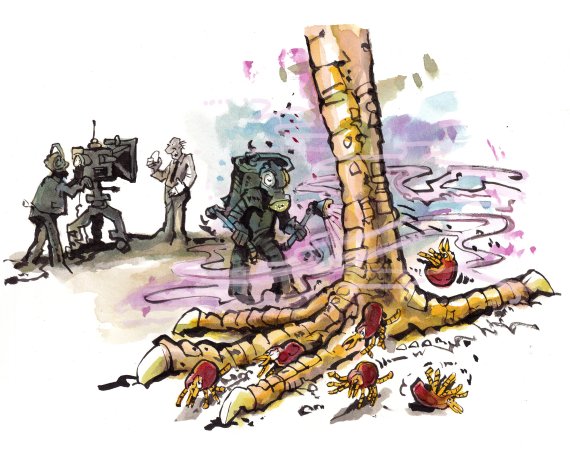text Yvonne de Hilster illustration Henk van Ruitenbeek

Ivonne Rietjens, professor of Toxicology
‘It astonished me that the Netherlands Food and Consumer Safety Authority (NVWA) talked of an acute danger to public health from the eggs with too high fipronil levels. I wonder whether a toxicologist looked at the public warning before it went out. Toxicity depends on the dose. A hefty margin is built into the norms for safe exposure. The norms are determined on the basis of animal studies, looking at what the highest dose of a substance is that has no ill effect on animals, and that level is divided by 100 to arrive at a safe dose for humans. So even if this safe limit is passed by double or treble the amount, you still cannot talk of an acute danger. But the law states that eggs must not contain any fipronil. So in this case it would have been better to announce that eggs had been recalled from retailers because a banned substance had been found in in them, but that there was no immediate danger to public health. The main thing we should learn from this is that these kinds of scandal are not the biggest threat to our health. The biggest threats coming from smoking and from consuming too much fat and too much salt. Those things make a lot of people in the Netherlands ill and cause many premature deaths. Not the amounts of fipronil found in eggs.’

Coen van Wagenberg, researcher on the economics of food safety at Wageningen Economic Research
‘What struck me about the fipronil affair was that the NVWA and the National Institute for Public Health and the Environment RIVM did not put out exactly the same message. The one said: don’t eat eggs for now. The other said: eggs are safe. Citizens see these organs as one whole, as ‘the government’. And they trust that government on food safety issues. Different messages undermine that trust. For export products such as eggs you can see that abroad, the Netherlands is increasingly seen as a single player. So a problem affecting a few companies quickly affects all the others. What would be interesting to find out is whether the costs of even more monitoring outweigh the benefits. Our food is very safe but it is an illusion to imagine you can rule out all risks.’

Bart Gremmen, professor of Ethics in the Life Sciences
‘You have to understand the fipronil issue from the point of view of the sector. It is a system that grew up in the 1950s when the broiler farming was separating from egg farming, and when innovation made it possible to produce large quantities of eggs.’ That system has disadvantages which you can’t do much about. Like the processing of superfluous male chicks into feed. That poultry farmers hired a cleaning firm which turned out to be using a banned substance is a mistake that could happen anywhere. But a mistake like that disrupts the system. Eggs pile up or are destroyed, farmers starve chickens to get the fipronil out of their systems, or they kill them because there is nothing more to be gained from them. The system cannot cope with this kind of disruption, so poultry farmers face serious financial difficulties. So you can only conclude that the companies in this system are constantly on the verge of bankruptcy. To be able to get rid of the immoral aspects of the system, you would need to charge a higher price for eggs. But that won’t rule out mistakes such as the use of banned substances. It remains the farmers’ responsibility to insist on seeing the paperwork from a cleaning company like that. But a better price would create space to abide by all the rules as well as go for effective and efficient production.’

Jeroen Candel, assistant professor of Public Administration and Policy
‘At the beginning of this century the budget of the NVWA was cut and it was moved from the ministry of Public Health to Agriculture (now Economic Affairs, Ed.). There have been warnings of a declining standard of supervision ever since. In 2014 too, the Lower House sought information about bad practices and the reasons for them. It is too easy now to point the finger at the inspectorate, whereas nothing was done about all the signals sent. So I hope that this crisis will ensure that attention is paid to the underlying causes of the problems at the NVWA. A fundamental discussion is needed about what the inspectorate looks like. It strikes me as a good idea for this body not just to check up on whether the sector carries out its inspections properly, but to have its feet on the ground as a service itself.’ Also, the recent shed fires show that there is a tension between risks and your mandate as an authority. The fact that a company observes the rules doesn’t tell you whether it takes any safety risks.’

Noëlle Aarts, professor of Communication and Change in Life Sciences
‘What the affair shows is that the facts as such are not very relevant in discussions. This is about poison, and something is poisonous if there is too much of it. But the Netherlands sets different standards on that than Belgium, for example. Things you can measure – such as temperature, particles in the air or fipronil in an egg – are known as “first order reality”. Second order reality covers interpretations, values and assessments. Things like whether you call a temperature cool or warm, or how many particles or how much fipronil we consider acceptable. In the discussions around fipronil, first- and second-order realities get mixed up. For most people it is not clear how people can arrive at different assessments based on the same facts. The institutions could have explained how the maximum permitted level is arrived at in the Netherlands, and that a large margin of safety is built in. Now there is plenty of scope for speculation and you can do anything you like with the information – which is happening too.’

